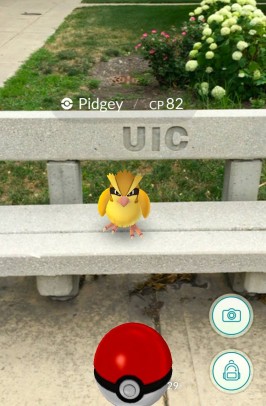Pokémon Go syllabus catches on
The mobile app that has taken users outside to catch ‘em all is now being brought into the classroom with a crowd-sourced Pokémon Go syllabus that was started by a UIC professor.
After witnessing the game’s notoriety, Adrienne Massanari was inspired by “the really great work that was done on the Black Lives Matter syllabus and the Beyoncé Lemonade syllabus,” said Massanari, assistant professor of communication.
“I decided that it was good for us to have a space where we could put all of those resources together and start talking about it.”
Pokémon Go, which was released by Niantic Inc. this summer, is an augmented reality game that uses real-world places as part of its game board. Users must go outside and walk around to geocatch Pokémon — Japanese cartoon characters — and become trainers by evolving their Pokémon and battling others.
The idea for the application stemmed from a franchise that started in the late 1990s, with games for the original Game Boy.
The syllabus was created as a Google Document this summer, and has more than 100 contributors from around the world, including researchers from Harvard University, Massachusetts Institute of Technology and Utrecht University in the Netherlands. It gained popularity through mailing lists, an academic association and social media.
“I intended it not to be mine. I just put it out there as, ‘Here’s some links that I came up with, and here’s some things to think about,’ and then it ballooned,” Massanari said.
The index includes links and listed sources for relevant literature, news, predecessors, class activities, discussion starters and the beginning of a weekly class schedule.
“It’s an effort to sort of say, ‘Well, there’s a whole history here of people talking about mobile media, about games, about the impact on culture, on health, all kinds of things,’” she said. “It’s important for us, as researchers, but also important for us culturally to understand and examine what we’re consuming and think hard about what does that say about us in that particular moment.”
Although the document is still in its infancy, it’s always growing — and it’s a good resource for anyone to use.
“It shows the strength of having an open-sourced, collaborative syllabus project,” said Jason Archer, a doctoral candidate in communication. He added links to the syllabus for news articles related to privacy, security and potential benefits for children with autism — the latter was suggested by his wife, Estela Mira Barreda, a UIC master’s student in the early childhood education program who is interested in working with children who have special needs.
“No one person could have put this together,” he said. “It gives us a window into many more perspectives, and it’s a shared resource for a large community.”
Although Massanari isn’t teaching a class focused on Pokémon Go, she’s including material from the syllabus in her Mass Media and Popular Culture course this semester. She will talk about games and game culture, the game’s cross-generational reach and Pokémon’s rise through fandom and nostalgia.
“I’m hoping that I can get them to download it on their phone and start playing, mostly because I know that UIC has a number of Pokémon stops and gyms,” Massanari said with a laugh. She was on level nine in early August. “There’s important work there that needs to be done.”
Contributors are encouraged to add their name to properly credit themselves.

